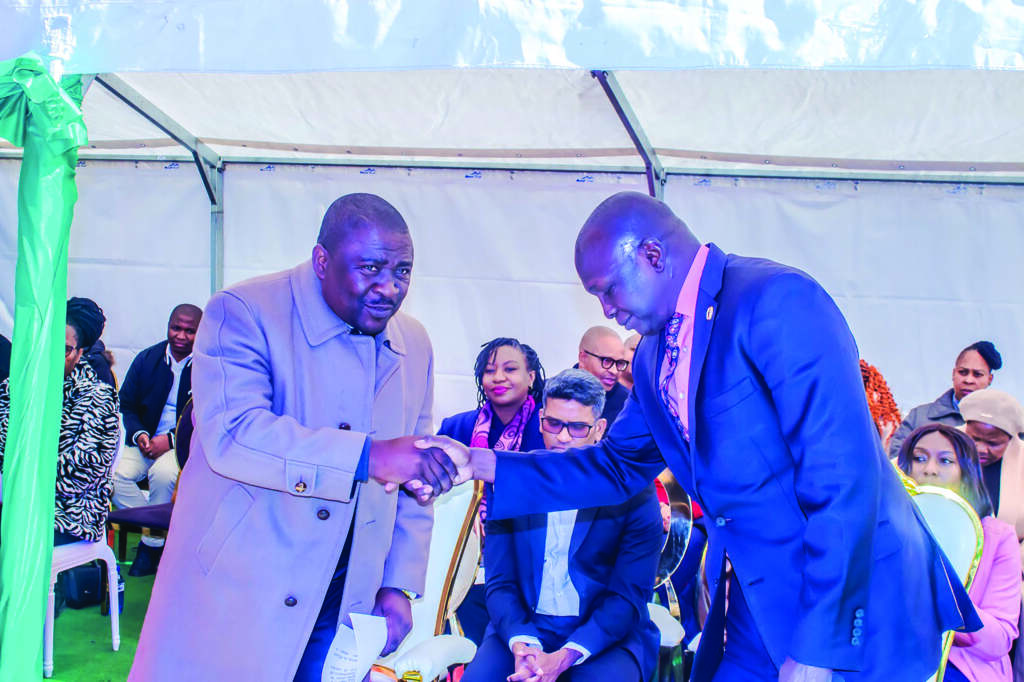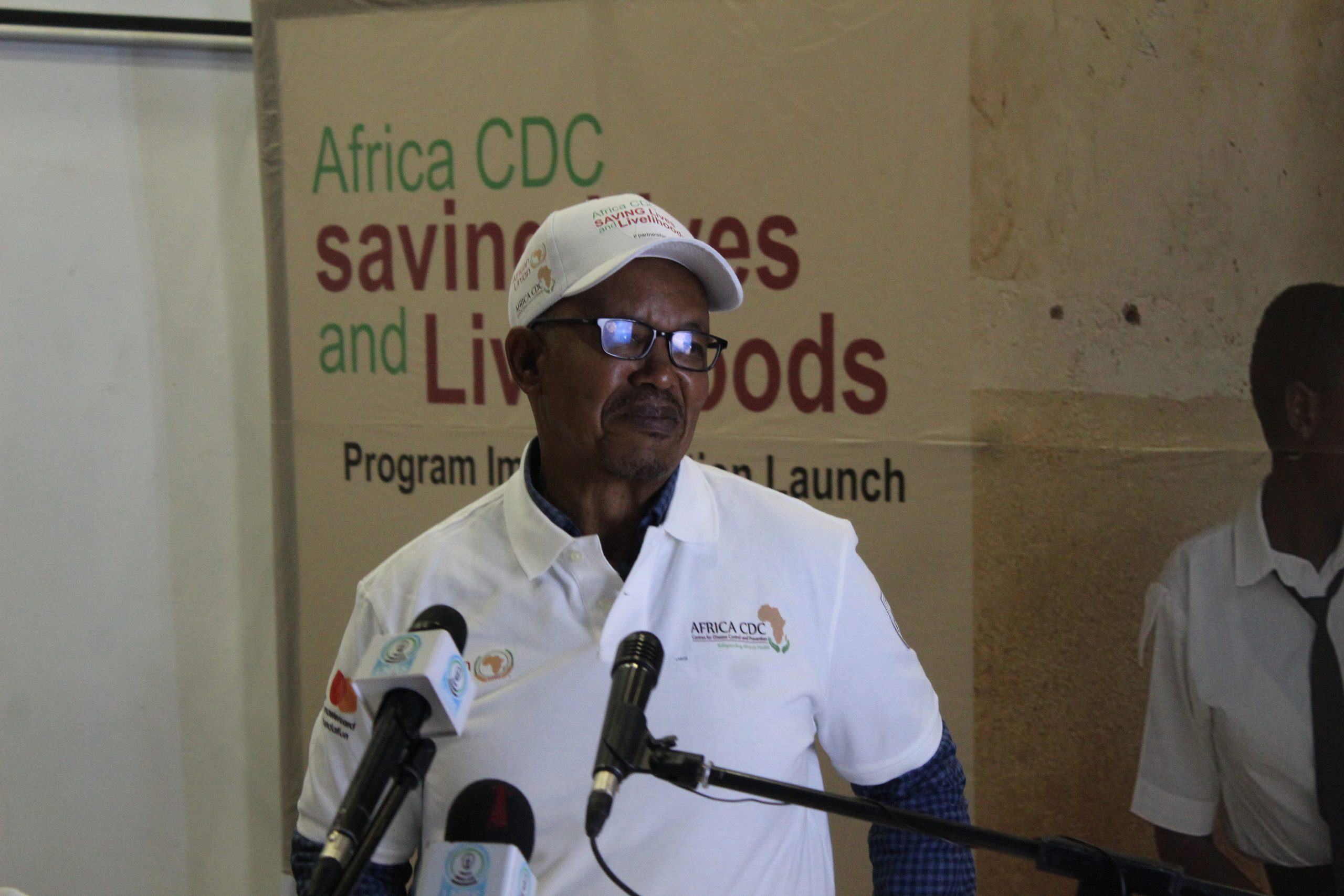Ntsoaki Motaung
In a bid to enhance vaccination coverage across the continent, the Africa CDC has handed over state-of-the-art vaccine cold chain equipment and a cold chain truck worth USD 113,446 to Lesotho.
Speaking at the handover ceremony held this week, Dr. Lul Riek, Regional Director of Africa CDC, representing Director General Dr. Jean Kaseya, emphasised the critical impact of this advanced equipment on vaccine storage and transportation.
Riek said this equipment will contribute to vaccine storage and transportation, ensuring their potency and safety from manufacturer.
He highlighted that this support underscores Africa CDC’s dedication to strengthening Lesotho’s health security.
“The world said with one voice, ‘never again,’ not once, but several times. Then COVID-19 came and exposed even further our global health vulnerabilities, serving as another warning that a bigger pandemic is coming,” he said.
He stressed the urgency of investing in health security and pandemic preparedness and stated that Africa does not need another wake-up call like COVID-19 to understand the urgency.
“Let’s act now, together, to strengthen continental health infrastructure, invest in preparedness, and prioritise health equity,” he urged.
Riek further noted the importance of immediate investment in health systems, including strengthening the One Health approach, antimicrobial resistance (AMR), and local manufacturing.
Africa cannot afford to wait, he emphasised.
The support was made possible through the Saving Lives and Livelihoods (SLL) Program, a partnership between the Mastercard Foundation and Africa CDC, in collaboration with UNICEF as a trusted procurement agent.
“This handover marks the end of the first phase of our commitment to Lesotho. However, Africa CDC is actively planning Saving Lives and Livelihoods Phase Two, focusing on completing the vaccination of healthcare workers and vulnerable groups, building a robust workforce of community health workers, and ensuring pandemic preparedness,” Riek disclosed.
Beyond the cold chain equipment, Africa CDC will support the government of Lesotho in establishing a world-class Public Health Emergency Operation Center, investing USD 500,000 in state-of-the-art equipment and training frontline health workers in preparation for the full establishment of the Lesotho National Public Health Institute.
Deputy Representative of UNICEF Lesotho, Kimanzi Muthengi, emphasised the significance of the handover.
Muthengi said the cold chain equipment symbolises UNICEF’s unwavering commitment to ensuring every child has access to life-saving vaccines, a mission that has never been more critical than in the wake of the COVID-19 pandemic.
He explained that the equipment would play a pivotal role in expanding the COVID-19 vaccination program and supporting routine immunisation efforts.
“By enhancing cold chain storage capacity, the Ministry of Health can offer a more comprehensive vaccination program, improving vaccine coverage rates and minimising vaccine wastage due to temperature fluctuations,” he added.
Minister of Health, Selibe Mochoboroane, detailed the equipment received, including a cold chain vehicle, 255 freeze-free vaccine carriers, 22 freeze-free cold boxes, a remote temperature monitoring device, 300 fridge tags, and 30 log tags.
Mochoboroane said these resources will strengthen our capacity to store and transport vaccines under optimal conditions, preserving their potency and effectiveness from manufacturer to the end user.
He assured that this equipment would enable a swift response to health emergencies, ensuring no community is left behind in the quest for universal health coverage as outlined in the Immunization Agenda 2030.
“I pledge to utilise this cold chain equipment effectively and responsibly,” he affirmed.
Acting WHO Country Representative, Dr. Mary Stephen, highlighted the cost-effectiveness of immunisation. “Immunisation is one of the most efficient and cost-effective public health interventions, preventing more than 3 million deaths every year,” she said.
She reiterated the global consensus on the value of vaccines. “Vaccines are universally recognized as among the safest, most cost-effective, and successful public health interventions to prevent diseases and deaths and enhance the quality of life,” Stephen noted.
Dr. Stephen concluded by affirming WHO’s readiness to support the Ministry of Health in capacitating health personnel to effectively use the equipment for the benefit of all Basotho.
Summary
- In a bid to enhance vaccination coverage across the continent, the Africa CDC has handed over state-of-the-art vaccine cold chain equipment and a cold chain truck worth USD 113,446 to Lesotho.
- Beyond the cold chain equipment, Africa CDC will support the government of Lesotho in establishing a world-class Public Health Emergency Operation Center, investing USD 500,000 in state-of-the-art equipment and training frontline health workers in preparation for the full establishment of the Lesotho National Public Health Institute.
- He assured that this equipment would enable a swift response to health emergencies, ensuring no community is left behind in the quest for universal health coverage as outlined in the Immunization Agenda 2030.

Your Trusted Source for News and Insights in Lesotho!
At Newsday Media, we are passionate about delivering accurate, timely, and engaging news and multimedia content to our diverse audience. Founded with the vision of revolutionizing the media landscape in Lesotho, we have grown into a leading hybrid media company that blends traditional journalism with innovative digital platforms.







